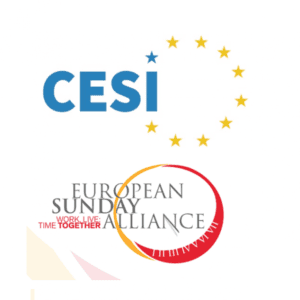2021-03-03 10:31
On March 3, the annual European Day for a Work-Free Sunday, CESI, as a member the European Sunday Alliance, calls on political leaders in Europe to put synchronised free time for workers back on the policy agenda.
 One of the major impacts of the lockdowns during this disastrous Covid-19 pandemic has been an acceleration of previous trends towards increasing levels of mobile and home working. In particular, with the rise of digital working, the fragmentation and de-limitation of working time has further proceeded. Working in the evenings and during weekends is increasingly common and indeed expected by many employers. This increases stress for workers while it affects their work-life balance; and this compromises the health and wellbeing of workers, making them not only sick in the long run but also causing increasingly more often their absence from work due to psychosocial illness for sustained periods of time.
One of the major impacts of the lockdowns during this disastrous Covid-19 pandemic has been an acceleration of previous trends towards increasing levels of mobile and home working. In particular, with the rise of digital working, the fragmentation and de-limitation of working time has further proceeded. Working in the evenings and during weekends is increasingly common and indeed expected by many employers. This increases stress for workers while it affects their work-life balance; and this compromises the health and wellbeing of workers, making them not only sick in the long run but also causing increasingly more often their absence from work due to psychosocial illness for sustained periods of time.
According to the European Sunday Alliance, a broad network of more than 100 national Sunday alliances, trade unions, employers’ organisations, civil society associations, churches and religious communities in the European Union of which CESI has been a member sine 2017, a full day of rest per week is indispensable to recover. Indeed a common day of rest can truly increase wellbeing and brings a positive effect on health: Only during a common day of rest is it possible to pursue volunteer work, civic engagement, joint social, sports or faith-related activities, family time and, more generally, to spend time together. Humans are social beings, and for many of them their health requires more than individual time off at scattered, random moments of the week to spend alone. The challenges of the pandemic have highlighted the need of human beings for structure in their daily routine. A day recognised by tradition or custom is essential as a day to disconnect, literally and figuratively.
Establishing a European right to disconnect is currently – and rightly so – debated throughout Europe. Work-life balance, as well as healthy, safe and well-adapted work environments, are at the heart of the European Pillar of Social Rights, which all EU institutions and Member States government have committed to implement.
On March 3, the annual European Day for a Work-Free Sunday, CESI joins the the European Sunday Alliance to call on political leaders in Europe to put synchronised free time as a priority on the social policy agenda and help make a tangible, visible and cherished improvement to the lives of citizens across Europe. In particular, the European Commission should align its upcoming proposal for a directive on a right to disconnect with article 2 of the Council of Europe’s Social Charter which already requires “a weekly rest period which shall, as far as possible, coincide with the day recognised by tradition or custom in the country or region concerned as a day of rest.”
Message of CESI Secretary General Klaus Heeger on the occasion of the annual European Day for a Work-Free Sunday on March 3 2021



